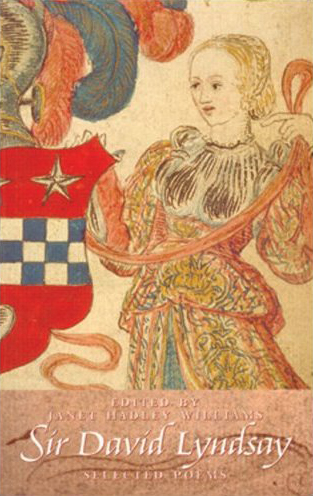
SIR DAVID LYNDSAY: SELECTED POEMS
Edited by Janet Hadley Williams
Paperback
Price: £12.50
ISBN 978-0-948877-46-9
Hardback
Price: £25.00
ISBN 978-0-948877-44-5
ASLS, Glasgow, January 2001
“Sir David Lyndsay: Selected Poems … contains all of Lyndsay’s significant shorter poetry, including Testament of the Papyngoand Squyer Meldrum. The introduction is short but useful, and the poems are laid out in a reader-friendly manner, with difficult words glossed at the bottom of the page. Explanatory notes are collected at the end of the book, followed by a remarkably thorough bibliography. Williams’s edition of Lyndsay makes some of the most important and provocative Scottish writing of the Reformation era accessible to a general audience, and provides teachers of Scottish literature (or British literature generally) with an attractive new option for their syllabuses.”
— The Year’s Work in English Studies
Click here for the article “The Poetry of Sir David Lyndsay” by Nicola Royan, published in ScotLit 22
Click here for the article “Sixteenth-century ‘agit-prop’: Sir David Lyndsay’s Ane Satyre of the Thrie Estaitis” by Chris Ravenhall, published in ScotLit 22
Born in the last years of James III’s reign, Sir David Lyndsay (c. 1486–1555) served under James IV, James V, and Mary. As a writer, Lyndsay is best known today for his play, Ane Satyre of The Thrie Estaitis, a biting and comic commentary on Church and State that is still regularly performed today. But it was Lyndsay’s other works, of which this volume offers an accessible selection, that made him the best known Scottish poet of the time. In the late sixteenth, seventeenth and eighteenth centuries, a literate household in Scotland was likely to own two books: the Bible and the poems of Sir David Lyndsay. Today, while a performance of Ane Satyre of the Thrie Estaitis can still draw the crowds, very little is known about the rest of Lyndsay’s work. This new volume from ASLS is designed to introduce some of Lyndsay’s best poems to a new audience.
Lyndsay’s greatest strength is his range and diversity, from comic verse to political satire to spiritual reflection. These are the features that made Lyndsay a popular writer in his own time; explored again, he might well regain that status in ours. The editor has planned the Selected Poems to introduce these works both to new readers, for whom there are on-the-page annotations and references, and to specialists, who will wish to work with freshly-established texts. The explanatory notes illustrate the richness of Lyndsay’s language and those contemporary references now less known. An Introduction provides biographical information and discusses important features of Lyndsay’s poetry, and a full Bibliography offers further support for scholars.
Dr Hadley Williams is a Visiting Fellow in English and Theatre Studies at the Australian National University. She is editor of Stewart Style 1513-1542: Essays on the Court of James V (1996).
CONTENTS
Acknowledgements
Introduction
- Sir David Lyndsay of the Mount, c. 1486–1555
- Lyndsay’s Literary Inheritance
- ‘Myne mater’: Lyndsay’s own writing
- Lyndsay’s Scots
- Editorial Approach
THE POEMS
- The Dreme
- The Complaynt of Schir David Lindesay
- The Testament and Complaynt of our Soverane Lordis Papyngo
- The Answer to the Kingis Flyting
- The Deploratioun of the Deith of Quene Magdalene
- The Justing betwix James Watsoun and Jhone Barbour
- The Tragedie of the Cardinall
- Squyer Meldrum
- The Testament of Squyer Meldrum
- Ane Dialog betwix Experience and ane Courteour (1—684)
Notes
Abbreviations and Bibliography